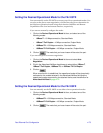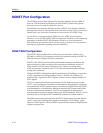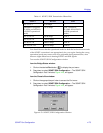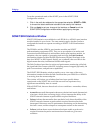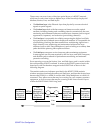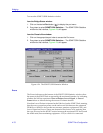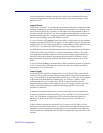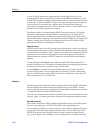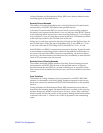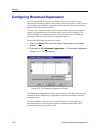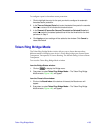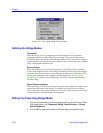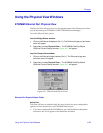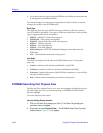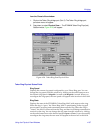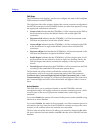
SONET Port Configuration 4-81
Bridging
Coding Violations are Bit Interleaved Parity (BIP) errors that are detected in the
incoming signal (as described below).
Severely Errored Seconds
The number of Severely Errored Seconds, or Far-End Severely Errored Seconds,
encountered by a SONET/SDH Path in the speciÞed interval.
A Severely Errored Second (SES) is a second with X or more coding violations
(bit parity errors) reported at the Section, Line, or Path layer of the SONET link, or
a second during which at least one or more incoming defects (e.g., Loss of Signal,
Loss of Pointer, or Loss of Frame) has occurred at that layer. The statistic provided
in this Þeld is provided by the STS-Path level of the link.
Values of X at each layer depend on the linkÕs line rate and the Bit Error Rate. For
the STS-Path layer, with a line rate of 51.84 Mbps (STS-1) and a BER of 1.5 x 10
-7
,
X is 9; with a line rate of 155.52 Mbps (STS-3) and a BER of 1 x 10
-7
, X is 16.
If the FE100-Sx or APIM-2x is experiencing consecutive Severely Errored Seconds,
it may indicate an impending period of network unavailability (which begins at
the onset of 10 consecutive SESs). Periods of unavailability can severely impact
service (e.g., the disconnection of switched services). Availability is restored at the
onset of 10 consecutive error-free seconds.
Severely Errored Framing Seconds
The counter associated with the number of Severely Errored Framing Seconds
encountered by a SONET/SDH Section in the speciÞed interval. A Severely
Errored Framing Second (SEFS) is a second containing one or more SEF events.
This counter is only counted at the Section Layer, and is not available as a Far-End
counter.
Code Violations
The number of Coding Violations (CVs) encountered by a SONET/SDH Path
interface, or the number of Far-End Coding Violations reported via the far-end
block error count to the monitored SONET/SDH Path interface, in the speciÞed
interval.
Coding Violations are Bit Interleaved Parity (BIP) transmission errors that are
detected in the incoming signal. Bit Interleaved Parity is a check at the receiving
interface that groups all bits in a block into a unit (e.g., a byte), then veriÞes the
block for parity for each bit position in the group by making sure that the number
of bits set to the value Ô1Õ is either even or odd, as reported by the transmitting
entity.



